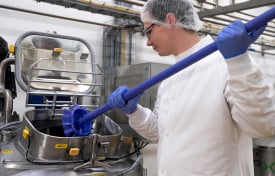pH

- January 26, 2016
On March 22nd, Nelson-Jameson is excited to offer our “pH Workshop” at the University of Wisconsin-Baraboo/Sauk County. The course will be facilitated by Nelson-Jameson’s in-house pH expert, Steve Zdun. The workshop is perfect for an array of food and beverage industry producers to learn more about the basic principles of successful, and effective pH analysis in the processing environment.
Participants will garner insight into a host of topics, including: sample preparation techniques, choosing the best electrode/meter for the job, the importance of Automatic Temperature Compensation, calibration techniques, cleaning/maintenance procedures, and basic trouble shooting. Steve has also planned time for a question and answer session, as well as one-on-one consultation. By the end of the session that runs from 9am-12pm, class participants will leave with a constructive base of information to take with them into their facilities, as well as receive a






